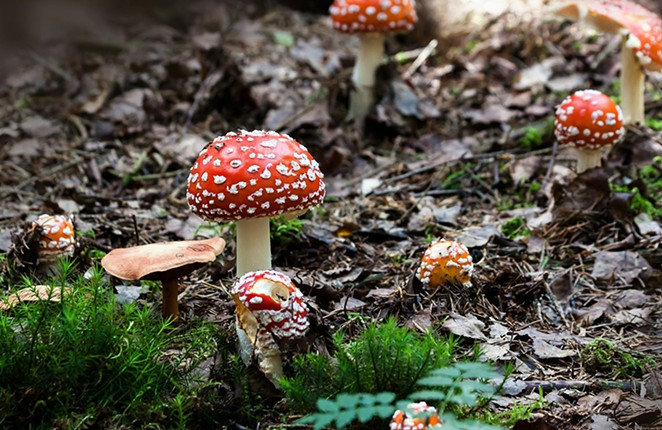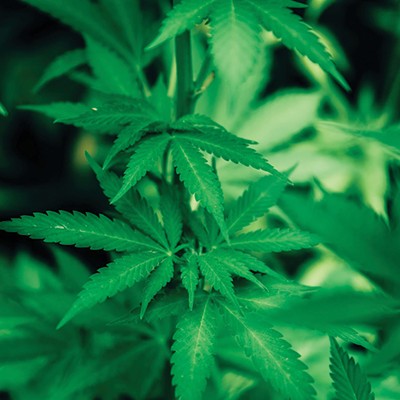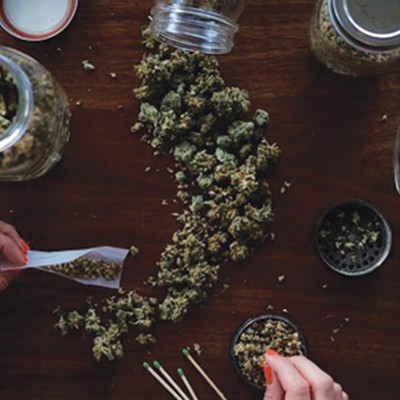"Magic" mushrooms have once again been in the news recently, and it hasn't been for the best of reasons. For regular readers, it may have a sense of deja vu, as it parallels a cannabis-related news cycle with disturbing similarities.
While sparking one up is always a good idea before diving in, feel free to nibble on some mushrooms for this one. (If nothing else, it will make the column funnier.)
The little-known brand with a name so annoying I want to punch its face, Diamond Shruumz, has been gaining widespread recognition as of late in the worst way — reportedly sickening, hospitalizing, and potentially killing its customers.
The Centers for Disease Control and Prevention reports that as of July 23, "74 total illnesses, including 38 hospitalizations, have been reported in 28 U.S. states with ongoing efforts to identify other potential cases. There are two potentially associated deaths under investigation." (And one of those 28 states is Oregon.)
Diamond Shruumz' line of chocolate bars, cones, and gummies were believed to be causing "seizures, central nervous system depression, loss of consciousness, confusion, sleepiness, agitation, abnormal heart rates, hyper/hypotension, nausea, and vomiting" in users, per the U.S. Food and Drug Administration. A recall was issued in June, but there are reports of some of the products still being on shelves.
Those shelves involve smoke and vape shops, as well as gas stations and mini marts. You do you, but maybe don't consume psychedelics you've picked up at the Gas n' Go. And maybe know what you are consuming in these products, because it's not psilocybin...except when it is.
The naturally occurring ingredient that puts the magic in magic mushrooms is psilocybin, and is considered a DEA Schedule 1 drug, along with cannabis, heroin, bath salts, ecstasy, LSD and others. Schedule 1 means the DEA believes that the drug or other substance has a "high potential for abuse, has no currently accepted medical treatment use in the U.S, and...has a lack of accepted safety for use under medical supervision."
California-based Prophet Premium Blends, owner of Diamond Shruumz, said it was initiating the recall after their Certificate of Analysis showed "higher than normal ...levels of Muscimol, a chemical found in mushrooms of the genus Amanita."
Also known as "fly agaric," it's a legal mushroom whose biggest claim to fame has been its impact on — I'm not kidding — our story of Santa Claus, as pagan Northern Europeans used to consume the mushroom during the winter solstice. It's a psychoactive mushroom, with effects that the American Journal of Preventive Medicine lists as "dizziness, dysphoria, visual hallucinations, agitation, ataxia, muscle fasciculation, seizures and coma."
This isn't to say that Muscimol is the only ingredient causing the illnesses. The Blue Ridge Poison Center at the University of Virginia also found Psilocin (a Schedule 1 substance) and Psilacetin, known as a "synthetic shroom," in Diamond Shruumz. Neither were listed as an active ingredient.
That parallel of which I spoke harkens back to 2017, when I wrote about the serious health issues and hospitalization of users of a synthetic cannabis product known as Spice, or K2. It was another case of people wanting access to something natural that the government has banned, leading to an industry designed to provide synthetic versions that while legal, may incur far greater damage to the user than the illegal (but far safer) products.
Even when made legal, as Oregon has done with psilocybin, access is not as easy as it is with cannabis. Mushrooms are not sold through brick-and-mortar dispensary style shops, but rather must be acquired and consumed on site at a state licensed Service Center, and taken under the guidance of a facilitator in two sessions. Prices range from $800 to $2,500, which may be a factor as to why many of these service centers are not exactly thriving.
Seeking out states of intoxication is natural and is best addressed with substances that are natural as well. But don't eat things with ingredients you can't confirm.





















